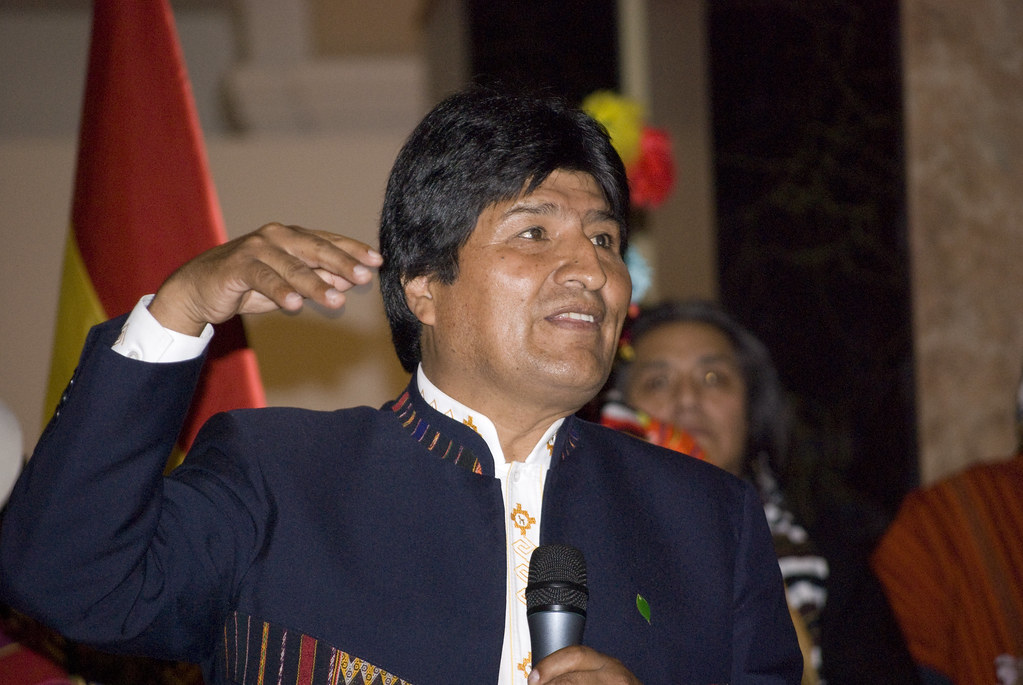UPDATE 4-"Everything is a mess": Morales exit rocks Bolivia, splits region

- Country:
- Bolivia
Looting and roadblocks convulsed Bolivia on Monday after President Evo Morales' resignation ended 14 years of socialist rule and left a power vacuum his opponents scrambled to fill.
The departure of Bolivia's first indigenous president, one of a wave of leftists who dominated Latin America's politics at the start of the century, came when the military abandoned him amid sustained unrest over a disputed Oct. 20 re-election. The 60-year-old former llama herder and coca leaf farmer was viewed by many as a champion of the poor who brought steady economic growth, but to others he was an autocrat who overstepped by defying a referendum on presidential term limits.
Foes celebrated his departure but also moved swiftly to find a temporary successor before a presumed new election in the landlocked nation that is one of South America's poorest, dependent on farming and natural gas. With Morales' deputy and many allies in government and parliament gone with him, opposition politician and Senate second vice-president Jeanine Añez flew into the capital La Paz saying she was willing to take control.
"If I have the support of those who carried out this movement for freedom and democracy, I will take on the challenge, only to do what's necessary to call transparent elections," said senator Añez, who is constitutionally next in line to assume the presidency. Overnight, gangs roamed the highland capital and other cities, businesses were attacked and properties were set on fire. Schools and shops were largely closed, while public transport halted, roads were blocked, and rival political groups clashed on the streets.
"I am afraid of what will happen, everything is a mess in the city. There are fights between neighbours," said Patricia Paredes, a 35-year-old secretary in La Paz. Morales' exact whereabouts were unknown, though it was thought he had flown in the presidential plane to his stronghold of Chapare province, where he rose to prominence as a union leader.
DIVIDED LATIN AMERICA
Morales said he stepped down to ease the violence but repeated on Monday accusations he was the victim of a conspiracy by political enemies including election rival Carlos Mesa and protest leader Luis Fernando Camacho.
"The world and our Bolivian patriots repudiate the coup," he tweeted. "They moved me to tears. They never abandoned me. I will never abandon them." Argentine President-elect Alberto Fernandez echoed Morales' denunciations of a coup, as did Mexico which has offered him asylum. "It's a coup because the army requested the resignation of the president, and that violates the constitutional order of that country," Mexican Foreign Minister Marcelo Ebrard said.
In a redrawing of Latin America's political landscape, the left has regained power in both Mexico and Argentina, though powerhouse Brazil still retains a right-wing government. "A great day," Brazilian President Jair Bolsonaro tweeted, in an apparent reference to events in Bolivia.
In Venezuela, opponents of Morales ally Nicolas Maduro also hailed the fall of the Bolivian leader whom they call a dictator, saying they hoped Maduro would be next. Further afield, the United States urged civilian leaders to keep control. Russia backed Morales, accusing the opposition of violence and quashing dialogue.
Amid the chaos, prominent Bolivian opposition figure and academic Waldo Albarracin tweeted that his house had been set on fire by Morales supporters. Another widely-shared video appeared to show people inside Morales' own property with graffiti daubed on the walls.
"People are trying to cause chaos," fretted Edgar Torrez, a 40-year-old business administrator in La Paz, saying politicians and criminals were all taking advantage of the situation.
TEMPORARY LEADER
Under Bolivian law, the head of the Senate would normally take over provisionally. However, Senate President Adriana Salvatierra also stepped down on Sunday. The Organization of American States (OAS), which had denounced "manipulations" of the October vote on Sunday prior to the military's withdrawal of support for Morales, exhorted Bolivian lawmakers to meet urgently to resolve the crisis.
Parliament took formal receipt of Morales' resignation letter on Monday. Legislators were expected to try and agree on an interim commission or member of parliament who would take temporary control, according to a constitutional lawyer. Añez, a member of the Democratic Union party and a senator for the department of Beni in the country's lowland northeast, flew into El Alto airport near La Paz on Monday.
Another senator Arturo Murillo told reporters she was taken by an Air Force helicopter to a military academy, from where she was expected to travel to Congress. "The military were waiting on the tarmac and they said it was safer to take them by helicopter," he said. "I want to trust the military. I have my faith in the police."
At a press conference, Mesa asked the police and mobilized civilian groups to guarantee the arrival of legislators across the political spectrum to the central Plaza Murillo to formalize Morales' resignation and push forward new elections. "Upon them (the lawmakers) rests the democracy and stability of the country," he said.
Bolivia under Morales had one of the region's strongest economic growth rates and its poverty rate was cut in half, but his determination to cling to power and run for a fourth term alienated many allies, even among indigenous communities.
(This story has not been edited by Devdiscourse staff and is auto-generated from a syndicated feed.)
ALSO READ
South Korea's Yoon joins early voting ahead of parliamentary elections
South Korea's Yoon joins early voting ahead of parliamentary elections
EC identifies 266 parliamentary seats with lower voter turnout; plans targeted intervention
Two arrested in Spain money laundering probe linked to Venezuelan government
Venezuela to allow safe passage to Argentina for Machado aides-sources










